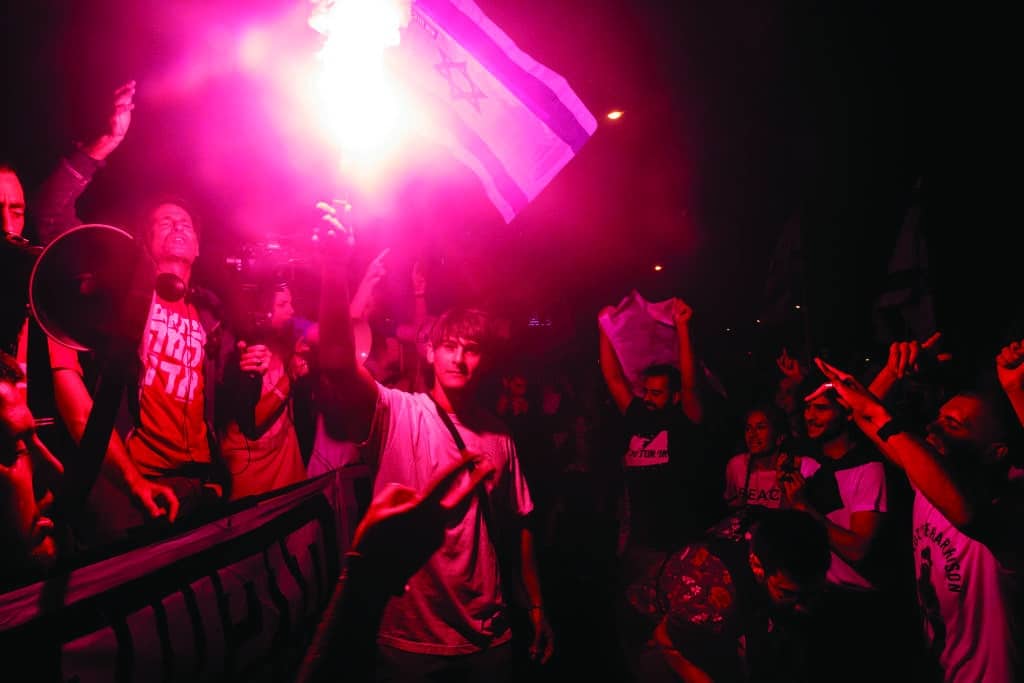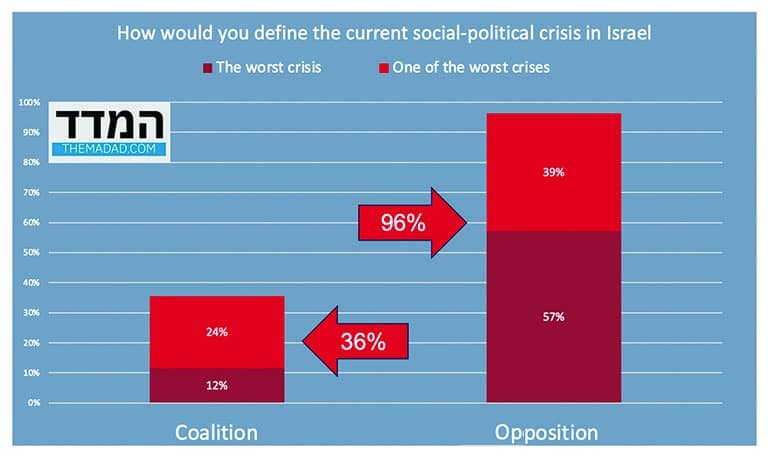 Protesters use smoke torches as they are protesting against the Israeli government’s judicial overhaul during Israel’s independence day on April 25, 2023 in Tel Aviv, Israel. (Photo by Amir Levy/Getty Images)
Protesters use smoke torches as they are protesting against the Israeli government’s judicial overhaul during Israel’s independence day on April 25, 2023 in Tel Aviv, Israel. (Photo by Amir Levy/Getty Images) Here’s a simple, chilling question I asked Israelis this week: Have you bought a candle yet? I urged them to do it. If you’re lucky, I told them, you’ll only use it on the high holidays. But I’m afraid we might need to use it sooner. Because Israel is moving, with open eyes and no sign of retreat, on a path leading to violence.
Political violence is often a self-fulfilling prophecy. The murder of Emil Grunzweig at a Peace Now demonstration in 1983, was the violent crescendo of a tense period. The assassination of Yitzhak Rabin in 1995 was also the violent crescendo of a tense period. In hindsight, neither should have come as surprise. Only the naiveness of a younger Israel made them surprising events. We really thought we were different, when we aren’t. We are like everyone else. As tension rises, the potential for violence rises. And as I write these words, the tension in Israel is at its peak.
State officials recently asked senior Shin Bet operators whether they are keeping an eye on extremist protesters and on extremists who might want to harm protesters. They are worried, and for good reason. It is not easy to identify in advance every random place that is prone to a violent flare-up.
One of the main problems that brought Israel to this moment concerns the gap between two camps in assessing the severity of the crisis. More than half of the opposition’s supporters say that the crisis facing Israel is “the worst in the country’s history”, and almost 40% more call it “one of the worst in the country’s history”. Coalition supporters do not see reality that way. Of course, they do see a crisis, but only a small minority of them (12% according to data we gathered this week), believe that it is the most severe in the country’s history. It’s not that the right is taking the situation lightly. A large group agrees that this is a serious crisis. But it also insists that “there are more serious crises than this one”.
More than half of the opposition’s supporters say that the crisis facing Israel is “the worst in the country’s history” and almost 40% more call it “one of the worst in the country’s history.”
Not every severe political crisis ends in violence. But the warning signs we see this week do not leave much room for optimism. The difference in perception of the severity of the crisis leads to misunderstanding that leads to frustration, despair and a sense of urgency. Those who oppose the government find it difficult to understand why they shout, cry, demonstrate – and still the government does not listen. Supporters of the government find it difficult to understand why their opponents shout, cry, demonstrate — and insist on preventing an implementation of a decision that has a clear mandate in the Knesset.
Both sides feel that their message is not getting through. So, day by day they raise their voices and sharpen their rhetoric to make the other side listen. And still, nothing seems to work. Which may well lead to the conclusion that only a very loud noise — of sirens, of pain, of a collision, of a mob — will get their point across.
How will this happen? The possibilities are many, which makes the danger more tangible. It can be a driver who loses patience as he is stuck in the endless traffic jams created by the protesters. It can be a police officer who has trouble controlling his nerves. It can be a demonstration that gets out of hand. It can be a loose cannon deciding to spill blood. It can happen today or tomorrow, or next week, or next month. And there will be nothing surprising about it.
When violence breaks out, the right will accuse the left of breaking the rules and the left will accuse the right of opacity and rapacity. But the ultimate question of guilt depends to a large extent on luck: Which side is responsible for the violence? And no one should be tempted to believe that the potential for violence is to be found only on “the other side”.
Did you buy a candle? If you love Israel, keep it in a nearby place, for use in case of need. Keep it for use when the familiar ritual of grief and remorse begins. Let it burn amid the tired parade of agonizing speeches by politicians, academics, rabbis, intellectuals, artists, celebrities.
They will all say gloomily: the writing was on the wall. And no one will object, because the writing is on the wall.
They will all ask gloomily: How did we degenerate into this? And the honest answer would be: quite easily.
Something I wrote in Hebrew
A new TV series attempts to define and describe secular Jews in Israel. Here’s what I said about it:
A large majority of the secular Jews in Israel also want Israel to be a Jewish state. In order for Israel to be a Jewish state, they need to define what is Judaism today. And Israeli secularism has two possible paths. If secularism is simply a negation of the religious way of life, then secularism will continue to need religiosity to some extent. It will not be a viable alternative to religiosity but will simply be the less dominant Jewish group. On the other hand, if secularism is a kind of new Jewish “stream,” or a new Jewish concept, then a more interesting competition is underway. In that case, Israeli secularism presents not a negation of something but an alternative to something — a new kind of Judaism.
A week’s numbers
Israelis can’t be convinced to compromise when such a wide difference in the perception of the severity of the crisis exists. 
A reader’s response:
Abraham Koppel asked: “what do you make of Biden saying that the current Israeli government is the most extreme ever?” My response: whether he should say such thing is a question we can ask, but when it comes to the actual situation, he is evidently right.
Shmuel Rosner is senior political editor. For more analysis of Israeli and international politics, visit Rosner’s Domain at jewishjournal.com/rosnersdomain.























 More news and opinions than at a Shabbat dinner, right in your inbox.
More news and opinions than at a Shabbat dinner, right in your inbox.